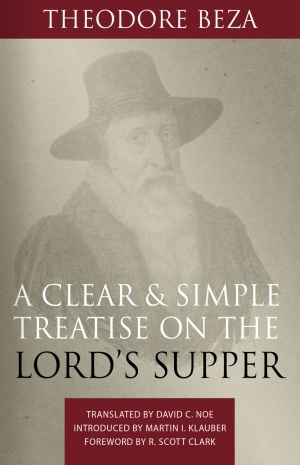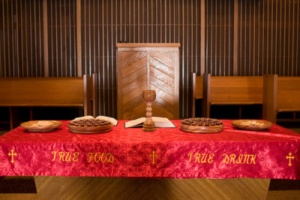One of the recurring questions I get is about the meaning of “body” in 1 Corinthians 11:29. The question is whether “discerning the body” in Paul’s narrative refers to “being cognizant of the congregation” or to Christ’s physical, actual body and blood, . . . Continue reading →
eucharist
Garry Wills Talks Priesthood, Transubstantiation, and Hebrews
(HT: Jordan Huff). It’s not often that one sees discussion of transubstantiation on Comedy Central or anywhere else for that matter (except perhaps EWTN). It’s interesting that Wills, a Roman Catholic, seems to feel no reluctance to attack Romanist dogma. It reminds . . . Continue reading →
Heidelberg 75: The Supper Is More Than A Memory (3)
75. How is it signified and sealed to you in the Holy Supper, that you do partake of the one sacrifice of Christ on the cross and all His benefits? Thus: that Christ has commanded me and all believers to eat of . . . Continue reading →
Coming Soon: Theodore Beza On The Lord’s Supper
Theodore Beza lived from 1519 until 1605. This means that he was a boy when the Reformation occurred and was nearing his death as the controversy between Arminius (whom Beza taught in Geneva) and the Reformed churches was developing. In between, he . . . Continue reading →
May A Christian College Administer Communion?
Andy Smith writes to ask about the administration of communion outside of the visible, institutional church. Specifically he writes to ask whether a Christian college or university may administer communion in chapel or in some other setting but the question is whether . . . Continue reading →
The Lord’s Supper Is Not Penance
In our course on the Reformed Confessions the end of the semester brings us near the end of the Belgic Confession, to article 35 on the Lord’s Supper. It is a marvelous confession of what God’s Word teaches us about the nature . . . Continue reading →
Created for Union: John Williamson Nevin And The Supper
On June 9, 1886, a funeral was held in a church in Lancaster, Pennsylvania. The deceased, John Williamson Nevin (1803–86), was a pastor, professor, and theologian in the German Reformed Church. Friends and family were in attendance as well as several theologians and professors of differing fame and reputation. None of this was unusual for a theologian’s funeral in nineteenth-century America. There was, however, at least one irregularity: A. A. Hodge (1823–16) gave one of the eulogies.1 Hodge’s late father, Charles Hodge (1797–1878), and Nevin were involved in one of the most prominent sacramental controversies in nineteenth-century America, yet the younger Hodge eulogized the very man who contested with his father decades before. Even now, the controversy and the theologies that gave rise to it live on long after the death of the major figures. Continue reading →
New Resource Page: On Holy Communion
Holy communion (the Lord’s Supper, the Eucharist) is one of the two sacraments instituted by Christ (Matt 26:26–29; Mark 14:22–25; Luke 22:14–23; 1 Cor 11:23–34). In the Reformed tradition whereas Baptism is regarded as the sacrament of initiation into the visible church, . . . Continue reading →
Irenaeus Did Not Teach A Romanist Doctrine Of Eucharistic Sacrifice
When the minister consecrates (i.e., sets apart for sacred use) the elements of the Lord’s Supper (i.e., bread and wine), what happens? Does the substance of the elements change? Does the bread become something other than it was? Does it become the . . . Continue reading →
Fed By Christ Or The Person Next To Me?
One of the recurring questions I get is about the meaning of body in 1 Corinthians 11:28. The question is whether “discerning the body” in Paul’s narrative refers to “being cognizant of the congregation” or to discerning Christ’s physical, actual body and blood, . . . Continue reading →








